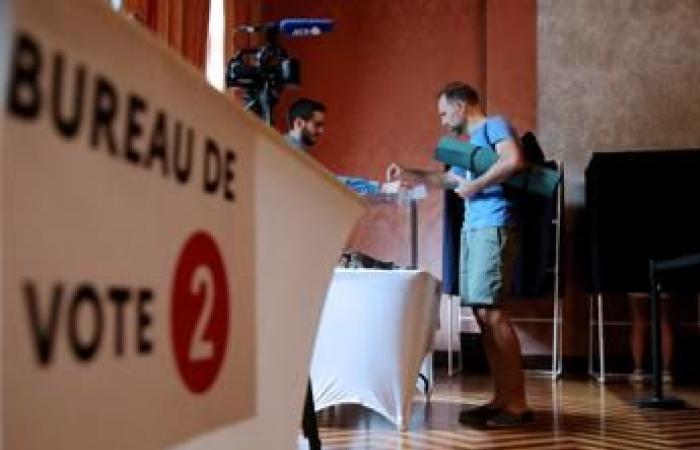Record turnout expected for the challenge between Nouveau Front Populaire, Ensemble, Les Républicains and Rassemblement National. What the polls say
France goes to the pollstoday June 30, for the early legislative elections called by Macron after the disappointing result in the European elections. A defeat that has the exploit of the right and Marine Le Pen in the country. The run-off elections are scheduled for next July 7.
Synthetic programmes, which reflect the priorities and main directions of each training course, for the four main political groups che si sfideranno: il Nouveau Front Populaire (Nfp), Ensemble, Les Républicains (Lr) e National Rally (Rn).
E’ Meanwhile, a record turnout is expected, with voters showing increased interest in voting. According to a survey conducted by Ifop-Fiducial for Le Figaro, Lci and Sud Radio, which provides final projections of seats based on voting intentions at a national level, participation is estimated at 67% (+3 in a week), or 19, 5 points more than the last legislative elections in 2022.
What the polls say
For now, the National Rassemblement (RN) and some of its center-right allies have around 36% support, while the left-wing New Popular Front group is at 29% and Macron’s liberals have around 21%.
In a month the head of the Elysée lost six points of popularity in a month, reaching 36%, the lowest level since last March, while the president of the Rassemblement national (RN) Jordan Bardella has become the political exponent whose French people trust them more, with 40% popularity. This is what a survey conducted by Toluna-Harris-LCI reports.
The confidence that the French place in Prime Minister Gabriel Attal remains stable at 43%. The ministers are also stable: the most popular among them, Interior Minister Gérald Darmanin, gains two points and stands at 35%.
How French Elections Work, The Numbers to Win
Members of the French parliament are not elected on the basis of proportional representation, but through a two-round vote in 577 constituencies where local dynamics play an important role. In each constituency, if no candidate receives 50% of the vote in the first round, the top two candidates advance to the second round, as do any other candidates who have won the support of at least 12.5% of registered voters. The candidate with the most votes in the second round wins the seat as a member of parliament.
To advance past the first round, parties that share a political vision, such as the country’s four main left-wing parties, tend to band together and agree not to pit candidates against each other. Voter turnout matters. In 2022, when turnout was close to 50%, parties needed to win about a quarter of the votes cast to reach 12.5% of registered voters. Turnout is expected to be higher in this election, making it easier for candidates to advance to the second vote.
National GatheringMarine Le Pen’s party needs at least 289 seats to win a majority in the French parliament, and the far right currently looks set to make big gains thanks to a successful campaign in the European elections. Opinion polls should be taken with a pinch of salt, warns Politico, but Rassemblement National (RN) and its allies could win between 220 and 260 seats according to current projections. That would be a record increase from the 88 MPs they currently have.
If the far right obtained a majority in Parliament, the French president would have to sign a ”cohabitation” agreement with the Rassemblement national and appoint a far-right prime minister. Jordan Bardella, the president of the Rassemblement national, has repeatedly said that he will not try to lead a government if he does not have an absolute majority. This presumably means he will need coalition partners, unless it is an electoral strategy to achieve a large turnout.
The far right has already reached an agreement with Éric Ciotti, leader of the centre-right party The Republicans, to support some like-minded conservatives so they don’t compete with each other in some constituencies. For the absolute majority, however, he would still need to obtain the support of other LR parliamentarians or of the Reconquest party, also of the far right, but its leader is hostile to Le Pen. The alliance between the centre-right and the far right is nevertheless a major ideological victory for the Rassemblement national, but it has also triggered a strong reaction among those conservatives horrified that the party of presidents such as Charles de Gaulle and Jacques Chirac is making deals with the far right.
But how much will Le Pen invest in coalition talks, given her desire to keep her political capital intact ahead of the 2027 presidential election? If her party leads a government that has a bumpy ride, it could hurt her chances of leading the Elysée.
L’Ensemblethe coalition backing the French president, includes his Renaissance party, the centrist MoDem and the center-right Horizons party. Ensemble currently controls 250 seats in parliament, but its support has been declining. Current projections see Ensemble’s lawmakers fall to fewer than 110 seats in the 577-person National Assembly, squeezed by both the left and the far right. For the first time, Macron’s coalition is not running as a single party. Horizons, the party led by former Prime Minister Édouard Philippe who has presidential ambitions, is going it alone, but could rejoin a coalition after the election.
Although Macron’s coalition is third in nationwide polls, there is still some glimmer of hope that it will not be completely swept away in the first round. A high turnout means three candidates are likely to advance to the second round in up to 170 constituencies, according to recent projections. This is both a blessing and a curse for Macron’s liberals and the left-wing alliance. The third best placed candidates in the three-way contests dominated by the far right will face pressure to withdraw and rally behind the second best placed to defeat the Rn candidate.
With unexpected speed, France’s left-wing parties then put aside their squabbles and united before the vote. Following an agreement, the far-left France insoumise (LFI), the Socialist Party, the Communist Party and the Greens are running single candidates in 546 constituencies across France. The alliance, called New Popular Front, is a revisited version of the 2022 Nupes alliance, created by Mélenchon. This time, however, the socialists are a much more powerful partner following the successful campaign of the socialist-backed candidate Raphael Glucksmann in the European elections. Of the 546 candidates who will represent the new alliance, 229 will be supported by France insoumise, compared to 175 for the socialists, 92 for the Greens and 50 for the communists.
The New Popular Front is certainly attracting voters, as current projections see the alliance winning 180 to 210 seats. It is true that 289 are needed to obtain a majority and the left would need to form a coalition if it aimed to propose a prime minister who obtains parliamentary approval. But such calculations will amount to nothing if the socialists and France insoumise, at odds on key issues such as Ukraine and Gaza, fail to put their differences aside. With the moderate Glucksmann and others having said they will never accept Mélenchon as prime minister, that may be a step too far.






